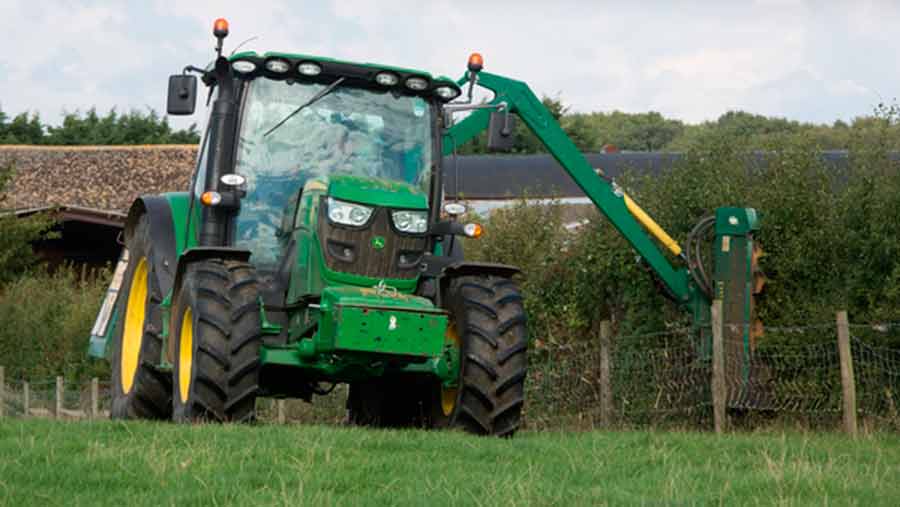Hedgecutting ban costs contractors thousands in lost income
 © Tim Scrivener
© Tim Scrivener Farm contractors say they are losing thousands of pounds in income after Defra extended the hedgecutting ban to cover the month of August.
Last year Defra extended the hedgecutting ban by one month to “protect late nesting birds”. The ban now runs from 1 March to 1 September in the UK.
Northamptonshire hedging contractor Bob Rutt said he lost a potential £6,000-£8,000 in revenue in 2015 because the extended ban forced to him to sit out August – normally the busiest period for hedgecutting.
Mr Rutt, who trims about 2,630ha of hedges in the Northamptonshire/Leicestershire/Rutland area, said: “The hedgecutting ban in August didn’t affect us straightaway, but it is affecting us at the end of the year and now.
See also: Hedgecutting ban – farm contractors demand rule change
“We are specialist contractors and we have very little other work apart from a bit of grass-cutting.
“We relied on that month to keep us going through the hard times. I have had to sell kit and one of my men has left. Some contractors are having to dip into their savings to keep going through the quiet months – and that can’t be right.”
Normally, farm contractors would follow the combines round in August and trim the hedges before cultivations.
But after Defra extended the hedgecutting ban, contractors have been forced to wait until 1 September before they can begin cutting hedges.
This policy means some farmers will only cut hedges every three years and they will be cutting about the thickness of your wrist, which makes a right mess Bob Rutt, hedging contractor
“Trimming hedges in August allowed us to keep out of the way of the cultivation equipment,” said Mr Rutt. “The problem now is that 90% of my customers will not allow me on the land once it has been cultivated.
“It is different if it is light land and you are on the fens. But on the heavier land it is a lot harder. I imagine hundreds of contractors as far north as Doncaster are faced with this same problem.”
Furthermore, many farmers are choosing not to cut hedges to save money amid the cashflow crisis engulfing farming.
MPs Q&A session
In a question and answer session held in the House of Commons on Thursday (5 May), Conservative MP Tom Pursglove (Corby and East Northamptonshire) asked Defra ministers if they had assessed the effect of the changes to hedgecutting regulations on contractors, farms and hedge maintenance.
Mr Pursglove highlighted Mr Rutt’s case, saying “he has no intention of harming wildlife, but the policy is seriously affecting his business”.
In reply, Rory Stewart, the parliamentary undersecretary of state at Defra, said: “I am happy to engage with farmers on this issue. It is important to understand, however, that certain birds, including blackbirds, turtle doves, goldfinches, bullfinches and whitethroats, have longer breeding and rearing seasons that last through August and into the beginning of September.”
Mr Stewart pointed out that two derogations were available to farmers and landowners to allow hedges to be cut in August for people planting oilseed rape and temporary grass.
Defra response ‘disappointing’
Mr Rutt told Farmers Weekly he was disappointed by the minister’s response and disagreed with his comments.
He said: “According to the RSPB website, most of these birds that the minister mentions will no longer be nesting through August and into September.
“They are migratrory birds and in July and August they are flying, on their way back to Africa.”
He added: “Birds do not nest in the outside of the hedge, they go inside it to be safe. Where we flail, we only cut the overgrowth, which is about the thickness of a pencil.
“This policy means some farmers will only cut hedges every three years and they will be cutting about the thickness of your wrist, which makes a right mess.”
Northamptonshire farm contractor Robert Hawtin, who farms in partnership with his son James, who does the hedgecutting, said the ban extension had been “bad news” and he lost more between £3,000 to £4,000 in potential income last August.
“We’ve never really caught up,” said Robert Hawtin. “By the time we got into September, some of the farmers didn’t bother to get their hedges done. They had drilled the winter wheat and they didn’t want us in there.”
A spokesman for SR Chesters Contractors, based in Staffordshire, said: “It would be better to cut a bit earlier, to start cutting before it gets wet. But we can’t do that because of this policy.”
- How has the extended hedgecutting ban affected your farm or business? Telephone 020 8652 4905 or email philip.case@rbi.co.uk
